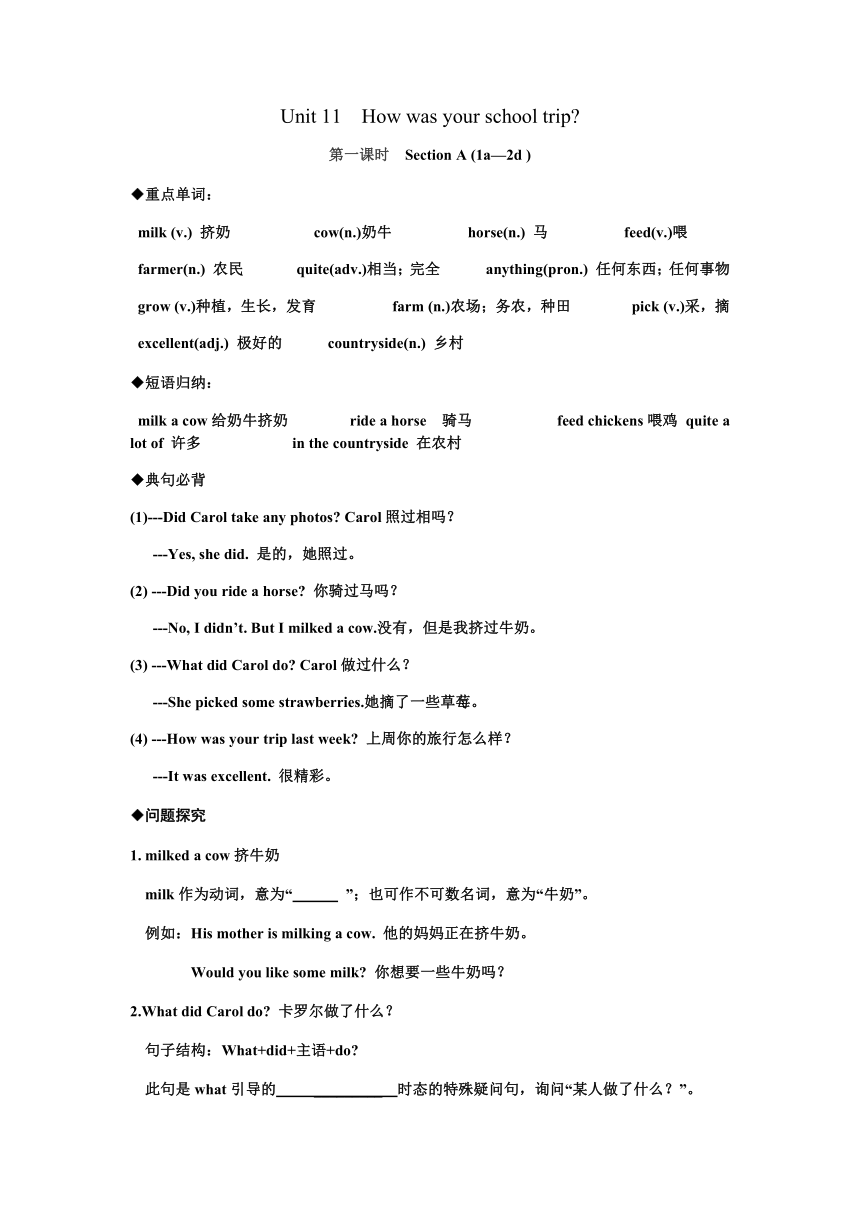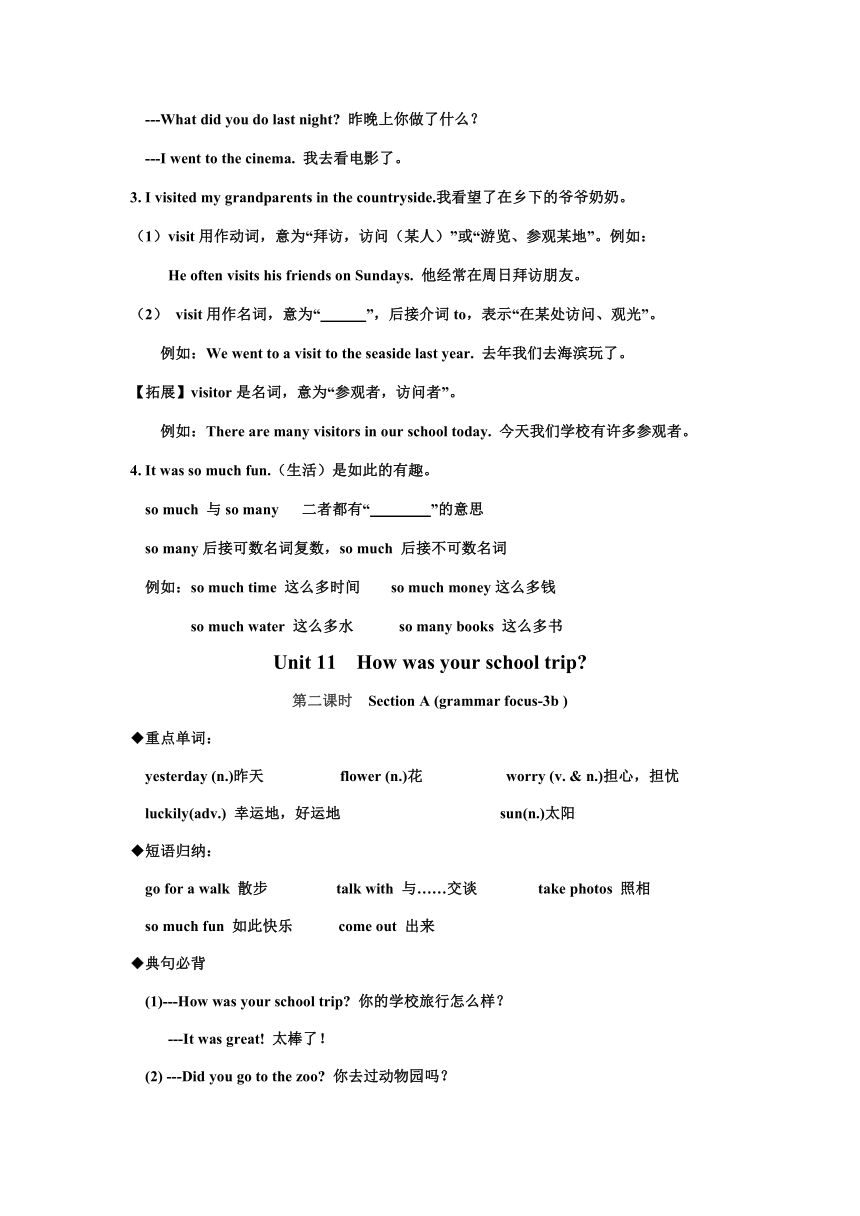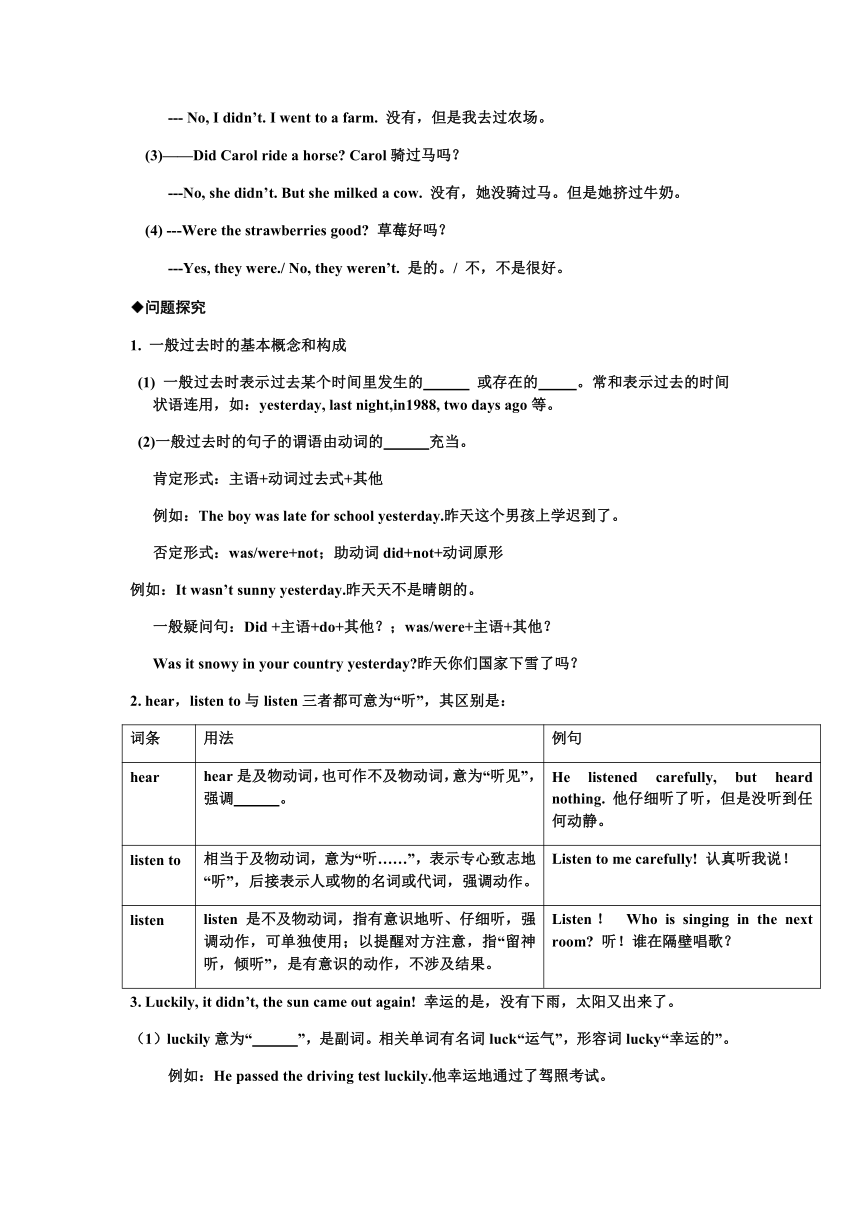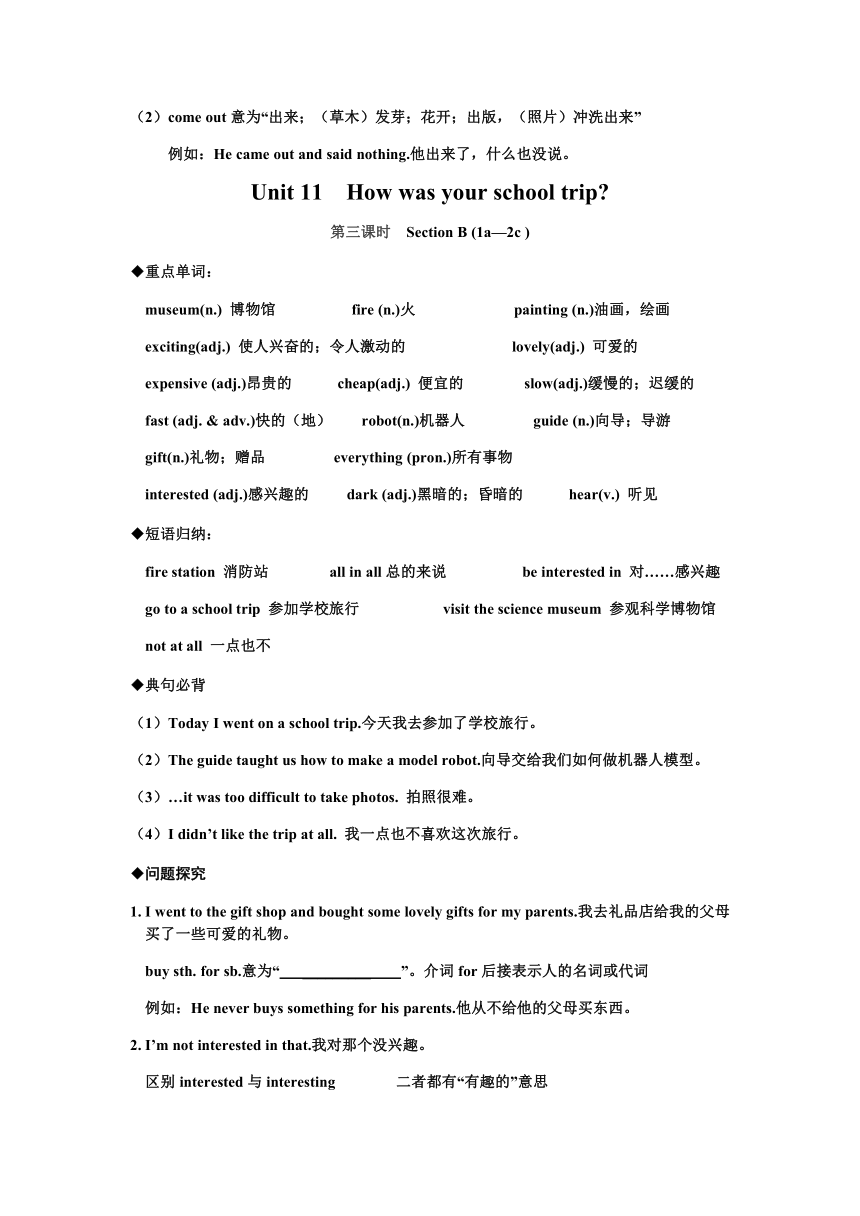Unit 11 How was your school trip 暑假复习学案
文档属性
| 名称 | Unit 11 How was your school trip 暑假复习学案 |  | |
| 格式 | docx | ||
| 文件大小 | 3.3MB | ||
| 资源类型 | 教案 | ||
| 版本资源 | 人教新目标(Go for it)版 | ||
| 科目 | 英语 | ||
| 更新时间 | 2023-08-08 23:08:55 | ||
图片预览




文档简介
Unit 11 How was your school trip
第一课时 Section A (1a—2d )
◆重点单词:
milk (v.) 挤奶 cow(n.)奶牛 horse(n.) 马 feed(v.)喂
farmer(n.) 农民 quite(adv.)相当;完全 anything(pron.) 任何东西;任何事物
grow (v.)种植,生长,发育 farm (n.)农场;务农,种田 pick (v.)采,摘
excellent(adj.) 极好的 countryside(n.) 乡村
◆短语归纳:
milk a cow给奶牛挤奶 ride a horse 骑马 feed chickens喂鸡 quite a lot of 许多 in the countryside 在农村
◆典句必背
(1)---Did Carol take any photos Carol照过相吗?
---Yes, she did. 是的,她照过。
(2) ---Did you ride a horse 你骑过马吗?
---No, I didn’t. But I milked a cow.没有,但是我挤过牛奶。
(3) ---What did Carol do Carol做过什么?
---She picked some strawberries.她摘了一些草莓。
(4) ---How was your trip last week 上周你的旅行怎么样?
---It was excellent. 很精彩。
◆问题探究
1. milked a cow挤牛奶
milk作为动词,意为“ ”;也可作不可数名词,意为“牛奶”。
例如:His mother is milking a cow. 他的妈妈正在挤牛奶。
Would you like some milk 你想要一些牛奶吗?
2.What did Carol do 卡罗尔做了什么?
句子结构:What+did+主语+do
此句是what引导的 _________ 时态的特殊疑问句,询问“某人做了什么?”。
---What did you do last night 昨晚上你做了什么?
---I went to the cinema. 我去看电影了。
3. I visited my grandparents in the countryside.我看望了在乡下的爷爷奶奶。
(1)visit用作动词,意为“拜访,访问(某人)”或“游览、参观某地”。例如:
He often visits his friends on Sundays. 他经常在周日拜访朋友。
(2) visit用作名词,意为“ ”,后接介词to,表示“在某处访问、观光”。
例如:We went to a visit to the seaside last year. 去年我们去海滨玩了。
【拓展】visitor是名词,意为“参观者,访问者”。
例如:There are many visitors in our school today. 今天我们学校有许多参观者。
4. It was so much fun.(生活)是如此的有趣。
so much 与so many 二者都有“ ”的意思
so many后接可数名词复数,so much 后接不可数名词
例如:so much time 这么多时间 so much money这么多钱
so much water 这么多水 so many books 这么多书
Unit 11 How was your school trip
第二课时 Section A (grammar focus-3b )
◆重点单词:
yesterday (n.)昨天 flower (n.)花 worry (v. & n.)担心,担忧
luckily(adv.) 幸运地,好运地 sun(n.)太阳
◆短语归纳:
go for a walk 散步 talk with 与……交谈 take photos 照相
so much fun 如此快乐 come out 出来
◆典句必背
(1)---How was your school trip 你的学校旅行怎么样?
---It was great! 太棒了!
(2) ---Did you go to the zoo 你去过动物园吗?
--- No, I didn’t. I went to a farm. 没有,但是我去过农场。
(3)——Did Carol ride a horse Carol骑过马吗?
---No, she didn’t. But she milked a cow. 没有,她没骑过马。但是她挤过牛奶。
(4) ---Were the strawberries good 草莓好吗?
---Yes, they were./ No, they weren’t. 是的。/ 不,不是很好。
◆问题探究
1. 一般过去时的基本概念和构成
(1) 一般过去时表示过去某个时间里发生的 或存在的 。常和表示过去的时间状语连用,如:yesterday, last night,in1988, two days ago等。
(2)一般过去时的句子的谓语由动词的 充当。
肯定形式:主语+动词过去式+其他
例如:The boy was late for school yesterday.昨天这个男孩上学迟到了。
否定形式:was/were+not;助动词did+not+动词原形
例如:It wasn’t sunny yesterday.昨天天不是晴朗的。
一般疑问句:Did +主语+do+其他?;was/were+主语+其他?
Was it snowy in your country yesterday 昨天你们国家下雪了吗?
2. hear,listen to与listen三者都可意为“听”,其区别是:
词条 用法 例句
hear hear是及物动词,也可作不及物动词,意为“听见”,强调 。 He listened carefully, but heard nothing. 他仔细听了听,但是没听到任何动静。
listen to 相当于及物动词,意为“听……”,表示专心致志地“听”,后接表示人或物的名词或代词,强调动作。 Listen to me carefully! 认真听我说!
listen listen 是不及物动词,指有意识地听、仔细听,强调动作,可单独使用;以提醒对方注意,指“留神听,倾听”,是有意识的动作,不涉及结果。 Listen! Who is singing in the next room 听!谁在隔壁唱歌?
3. Luckily, it didn’t, the sun came out again! 幸运的是,没有下雨,太阳又出来了。
(1)luckily意为“ ”,是副词。相关单词有名词luck“运气”,形容词lucky“幸运的”。
例如:He passed the driving test luckily.他幸运地通过了驾照考试。
(2)come out意为“出来;(草木)发芽;花开;出版,(照片)冲洗出来”
例如:He came out and said nothing.他出来了,什么也没说。
Unit 11 How was your school trip
第三课时 Section B (1a—2c )
◆重点单词:
museum(n.) 博物馆 fire (n.)火 painting (n.)油画,绘画
exciting(adj.) 使人兴奋的;令人激动的 lovely(adj.) 可爱的
expensive (adj.)昂贵的 cheap(adj.) 便宜的 slow(adj.)缓慢的;迟缓的
fast (adj. & adv.)快的(地) robot(n.)机器人 guide (n.)向导;导游
gift(n.)礼物;赠品 everything (pron.)所有事物
interested (adj.)感兴趣的 dark (adj.)黑暗的;昏暗的 hear(v.) 听见
◆短语归纳:
fire station 消防站 all in all总的来说 be interested in 对……感兴趣
go to a school trip 参加学校旅行 visit the science museum 参观科学博物馆
not at all 一点也不
◆典句必背
(1)Today I went on a school trip.今天我去参加了学校旅行。
(2)The guide taught us how to make a model robot.向导交给我们如何做机器人模型。
(3)…it was too difficult to take photos. 拍照很难。
(4)I didn’t like the trip at all. 我一点也不喜欢这次旅行。
◆问题探究
1. I went to the gift shop and bought some lovely gifts for my parents.我去礼品店给我的父母买了一些可爱的礼物。
buy sth. for sb.意为“ _________ ”。介词for后接表示人的名词或代词
例如:He never buys something for his parents.他从不给他的父母买东西。
2. I’m not interested in that.我对那个没兴趣。
区别interested与interesting 二者都有“有趣的”意思
interested意为“感到有趣的”,主语是人,短语有be interested in…“ _______ ”。interesting意为“令人感兴趣的”,主语是事物。例如:
This is an interesting book. I am interested in it. 这是一本令人感兴趣的书。我对它很感兴趣。
3. There were also too many people and I couldn’t really see or hear the guide. 那里也有太多的
人,我几乎看不到或听不到导游在说什么。
too many意为“太多”,后接 。与此相比较的是too much+不可数名词
much too+形容词/副词原形。例如:
There are too many birds in the forest.森林里的鸟太多了。
There is too much rain this year. 今年的雨水太多了。
It was much too noisy in the factory. 过去这家工厂里太吵。
4. I didn’t like the trip at all. 我一点也不喜欢这次旅行。
not… at all意为“ ”,not与助动词构成句子否定,at all放在句末。
He can’t swim at all. 他根本不会游泳。
而Not at all则是口语中常见用语,用作Thank you的答语,相当于You are welcome.
“不用客气;不用谢”。例如:
---Thanks a lot. --- Not at all. ---多谢。---别客气。
Unit 11 How was your school trip
第四课时 Section B (3a—3c ) & Self Check
◆重点单词:
boring 无聊的 interesting令人感兴趣的 great伟大的
◆短语归纳:
take photos照相 buy some gifts买礼物
by bus乘公共汽车 go to the countryside去农村
◆典句必背
(1)Yesterday we visited the zoo.昨天我们参观了动物园。
(2)We went there by bus. 我们坐公共汽车到那儿。
(3)We saw a lot of animals and took some photos. 我们看到许多动物并拍了很多照片。
(4)It was a great day. 这是愉快的一天。
◆问题探究
1. It was a boring day. 今天真无聊。
boring意为“令人感到无聊的”,多修饰事物
bored意为“感到无聊的”,描述人的心理感受
We are bored because the movie is too boring.
我们感到很无聊,因为这场电影太让人感到无聊了。
2. The air was so clean.空气是如此清新。
so修饰clean,意为“如此”,是副词。such意为“如此”,修饰名词,是形容词。
常用句型结构有:so…that…“如此……以至于……”。
The movie was so boring that I fell asleep soon.这部电影如此无聊,以至于我很快就睡着了。
3. 动词过去式
规则动词的过去式的变化规则:
(1) 直接加-ed。work-worked
(2)以不发音的字母e结尾的单词,直接加-d. live-lived hope-hoped
(3)以辅音字母+y结尾的, 再加ed。
(4) 以元音字母+y结尾的,直接加-ed. enjoy-enjoyed play-played
(5)以重读闭音节结尾的,双写最后的辅音字母加-ed。stop- stopped plan-planned
不规则变化无规律可循,则需牢牢记住。
have-had do/does-did are-were am/is-was go-went say-said think-thought teach-taught sit-sat cut-cut
Unit 11 How was your school trip
第五课时
◆用法集萃
1. How + be… + like ……怎么样?
2. too many + 可数名词复数 太多的……
3. teach sb. how to do sth. 教某人怎样做某事
4. quite + a / an + 形容词+可数名词单数 = a + very + 形容词+可数名词单数
一个相当 / 很……
◆话题写作
I had a busy weekend. On Saturday morning, I did my homework, and then I played computer games. In the afternoon, I visited my grandmother. We talked for a long time.
On Sunday morning, I cleaned my room and did some reading. Then I cooked for my parents. In the afternoon, I watched a football match on TV and listened to music. I had a good time.
◆单元小结
◆教学反思
第一课时 Section A (1a—2d )
◆重点单词:
milk (v.) 挤奶 cow(n.)奶牛 horse(n.) 马 feed(v.)喂
farmer(n.) 农民 quite(adv.)相当;完全 anything(pron.) 任何东西;任何事物
grow (v.)种植,生长,发育 farm (n.)农场;务农,种田 pick (v.)采,摘
excellent(adj.) 极好的 countryside(n.) 乡村
◆短语归纳:
milk a cow给奶牛挤奶 ride a horse 骑马 feed chickens喂鸡 quite a lot of 许多 in the countryside 在农村
◆典句必背
(1)---Did Carol take any photos Carol照过相吗?
---Yes, she did. 是的,她照过。
(2) ---Did you ride a horse 你骑过马吗?
---No, I didn’t. But I milked a cow.没有,但是我挤过牛奶。
(3) ---What did Carol do Carol做过什么?
---She picked some strawberries.她摘了一些草莓。
(4) ---How was your trip last week 上周你的旅行怎么样?
---It was excellent. 很精彩。
◆问题探究
1. milked a cow挤牛奶
milk作为动词,意为“ ”;也可作不可数名词,意为“牛奶”。
例如:His mother is milking a cow. 他的妈妈正在挤牛奶。
Would you like some milk 你想要一些牛奶吗?
2.What did Carol do 卡罗尔做了什么?
句子结构:What+did+主语+do
此句是what引导的 _________ 时态的特殊疑问句,询问“某人做了什么?”。
---What did you do last night 昨晚上你做了什么?
---I went to the cinema. 我去看电影了。
3. I visited my grandparents in the countryside.我看望了在乡下的爷爷奶奶。
(1)visit用作动词,意为“拜访,访问(某人)”或“游览、参观某地”。例如:
He often visits his friends on Sundays. 他经常在周日拜访朋友。
(2) visit用作名词,意为“ ”,后接介词to,表示“在某处访问、观光”。
例如:We went to a visit to the seaside last year. 去年我们去海滨玩了。
【拓展】visitor是名词,意为“参观者,访问者”。
例如:There are many visitors in our school today. 今天我们学校有许多参观者。
4. It was so much fun.(生活)是如此的有趣。
so much 与so many 二者都有“ ”的意思
so many后接可数名词复数,so much 后接不可数名词
例如:so much time 这么多时间 so much money这么多钱
so much water 这么多水 so many books 这么多书
Unit 11 How was your school trip
第二课时 Section A (grammar focus-3b )
◆重点单词:
yesterday (n.)昨天 flower (n.)花 worry (v. & n.)担心,担忧
luckily(adv.) 幸运地,好运地 sun(n.)太阳
◆短语归纳:
go for a walk 散步 talk with 与……交谈 take photos 照相
so much fun 如此快乐 come out 出来
◆典句必背
(1)---How was your school trip 你的学校旅行怎么样?
---It was great! 太棒了!
(2) ---Did you go to the zoo 你去过动物园吗?
--- No, I didn’t. I went to a farm. 没有,但是我去过农场。
(3)——Did Carol ride a horse Carol骑过马吗?
---No, she didn’t. But she milked a cow. 没有,她没骑过马。但是她挤过牛奶。
(4) ---Were the strawberries good 草莓好吗?
---Yes, they were./ No, they weren’t. 是的。/ 不,不是很好。
◆问题探究
1. 一般过去时的基本概念和构成
(1) 一般过去时表示过去某个时间里发生的 或存在的 。常和表示过去的时间状语连用,如:yesterday, last night,in1988, two days ago等。
(2)一般过去时的句子的谓语由动词的 充当。
肯定形式:主语+动词过去式+其他
例如:The boy was late for school yesterday.昨天这个男孩上学迟到了。
否定形式:was/were+not;助动词did+not+动词原形
例如:It wasn’t sunny yesterday.昨天天不是晴朗的。
一般疑问句:Did +主语+do+其他?;was/were+主语+其他?
Was it snowy in your country yesterday 昨天你们国家下雪了吗?
2. hear,listen to与listen三者都可意为“听”,其区别是:
词条 用法 例句
hear hear是及物动词,也可作不及物动词,意为“听见”,强调 。 He listened carefully, but heard nothing. 他仔细听了听,但是没听到任何动静。
listen to 相当于及物动词,意为“听……”,表示专心致志地“听”,后接表示人或物的名词或代词,强调动作。 Listen to me carefully! 认真听我说!
listen listen 是不及物动词,指有意识地听、仔细听,强调动作,可单独使用;以提醒对方注意,指“留神听,倾听”,是有意识的动作,不涉及结果。 Listen! Who is singing in the next room 听!谁在隔壁唱歌?
3. Luckily, it didn’t, the sun came out again! 幸运的是,没有下雨,太阳又出来了。
(1)luckily意为“ ”,是副词。相关单词有名词luck“运气”,形容词lucky“幸运的”。
例如:He passed the driving test luckily.他幸运地通过了驾照考试。
(2)come out意为“出来;(草木)发芽;花开;出版,(照片)冲洗出来”
例如:He came out and said nothing.他出来了,什么也没说。
Unit 11 How was your school trip
第三课时 Section B (1a—2c )
◆重点单词:
museum(n.) 博物馆 fire (n.)火 painting (n.)油画,绘画
exciting(adj.) 使人兴奋的;令人激动的 lovely(adj.) 可爱的
expensive (adj.)昂贵的 cheap(adj.) 便宜的 slow(adj.)缓慢的;迟缓的
fast (adj. & adv.)快的(地) robot(n.)机器人 guide (n.)向导;导游
gift(n.)礼物;赠品 everything (pron.)所有事物
interested (adj.)感兴趣的 dark (adj.)黑暗的;昏暗的 hear(v.) 听见
◆短语归纳:
fire station 消防站 all in all总的来说 be interested in 对……感兴趣
go to a school trip 参加学校旅行 visit the science museum 参观科学博物馆
not at all 一点也不
◆典句必背
(1)Today I went on a school trip.今天我去参加了学校旅行。
(2)The guide taught us how to make a model robot.向导交给我们如何做机器人模型。
(3)…it was too difficult to take photos. 拍照很难。
(4)I didn’t like the trip at all. 我一点也不喜欢这次旅行。
◆问题探究
1. I went to the gift shop and bought some lovely gifts for my parents.我去礼品店给我的父母买了一些可爱的礼物。
buy sth. for sb.意为“ _________ ”。介词for后接表示人的名词或代词
例如:He never buys something for his parents.他从不给他的父母买东西。
2. I’m not interested in that.我对那个没兴趣。
区别interested与interesting 二者都有“有趣的”意思
interested意为“感到有趣的”,主语是人,短语有be interested in…“ _______ ”。interesting意为“令人感兴趣的”,主语是事物。例如:
This is an interesting book. I am interested in it. 这是一本令人感兴趣的书。我对它很感兴趣。
3. There were also too many people and I couldn’t really see or hear the guide. 那里也有太多的
人,我几乎看不到或听不到导游在说什么。
too many意为“太多”,后接 。与此相比较的是too much+不可数名词
much too+形容词/副词原形。例如:
There are too many birds in the forest.森林里的鸟太多了。
There is too much rain this year. 今年的雨水太多了。
It was much too noisy in the factory. 过去这家工厂里太吵。
4. I didn’t like the trip at all. 我一点也不喜欢这次旅行。
not… at all意为“ ”,not与助动词构成句子否定,at all放在句末。
He can’t swim at all. 他根本不会游泳。
而Not at all则是口语中常见用语,用作Thank you的答语,相当于You are welcome.
“不用客气;不用谢”。例如:
---Thanks a lot. --- Not at all. ---多谢。---别客气。
Unit 11 How was your school trip
第四课时 Section B (3a—3c ) & Self Check
◆重点单词:
boring 无聊的 interesting令人感兴趣的 great伟大的
◆短语归纳:
take photos照相 buy some gifts买礼物
by bus乘公共汽车 go to the countryside去农村
◆典句必背
(1)Yesterday we visited the zoo.昨天我们参观了动物园。
(2)We went there by bus. 我们坐公共汽车到那儿。
(3)We saw a lot of animals and took some photos. 我们看到许多动物并拍了很多照片。
(4)It was a great day. 这是愉快的一天。
◆问题探究
1. It was a boring day. 今天真无聊。
boring意为“令人感到无聊的”,多修饰事物
bored意为“感到无聊的”,描述人的心理感受
We are bored because the movie is too boring.
我们感到很无聊,因为这场电影太让人感到无聊了。
2. The air was so clean.空气是如此清新。
so修饰clean,意为“如此”,是副词。such意为“如此”,修饰名词,是形容词。
常用句型结构有:so…that…“如此……以至于……”。
The movie was so boring that I fell asleep soon.这部电影如此无聊,以至于我很快就睡着了。
3. 动词过去式
规则动词的过去式的变化规则:
(1) 直接加-ed。work-worked
(2)以不发音的字母e结尾的单词,直接加-d. live-lived hope-hoped
(3)以辅音字母+y结尾的, 再加ed。
(4) 以元音字母+y结尾的,直接加-ed. enjoy-enjoyed play-played
(5)以重读闭音节结尾的,双写最后的辅音字母加-ed。stop- stopped plan-planned
不规则变化无规律可循,则需牢牢记住。
have-had do/does-did are-were am/is-was go-went say-said think-thought teach-taught sit-sat cut-cut
Unit 11 How was your school trip
第五课时
◆用法集萃
1. How + be… + like ……怎么样?
2. too many + 可数名词复数 太多的……
3. teach sb. how to do sth. 教某人怎样做某事
4. quite + a / an + 形容词+可数名词单数 = a + very + 形容词+可数名词单数
一个相当 / 很……
◆话题写作
I had a busy weekend. On Saturday morning, I did my homework, and then I played computer games. In the afternoon, I visited my grandmother. We talked for a long time.
On Sunday morning, I cleaned my room and did some reading. Then I cooked for my parents. In the afternoon, I watched a football match on TV and listened to music. I had a good time.
◆单元小结
◆教学反思
同课章节目录
